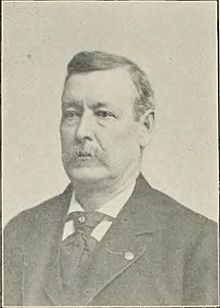The Hepburn Act is a 1906 United States federal law that gave the Interstate Commerce Commission (ICC) the power to set maximum railroad rates and extend its jurisdiction. This led to the discontinuation of free passes to loyal shippers. In addition, the ICC could view the railroads' financial records, a task simplified by standardized bookkeeping systems. For any railroad that resisted, the ICC's conditions would remain in effect until the outcome of legislation said otherwise. By the Hepburn Act, the ICC's authority was extended to cover bridges, terminals, ferries, railroad sleeping cars, express companies and oil pipelines.
Along with the Elkins Act of 1903, the Hepburn Act, named for its sponsor, eleven-term Republican William Peters Hepburn, was a subset of one of President Theodore Roosevelt's major goals: railroad regulation.
The final version was close to what Roosevelt had asked, and easily passed Congress with only three dissenting votes. The most important provision gave the ICC the power to replace existing rates with "just-and-reasonable" maximum rates, with the ICC to define what was just and reasonable. The Act made ICC orders binding; that is, the railroads had to either obey or contest the ICC orders in federal court. To speed the process, appeals from the district courts would go directly to the U.S. Supreme Court.
Anti-rebate provisions were toughened, free passes were outlawed, and the penalties for violation were increased. The ICC staff grew from 104 in 1890 to 178 in 1905, 330 in 1907, and 527 in 1909. Finally, the ICC gained the power to prescribe a uniform system of accounting, require standardized reports, and inspect railroad accounts.
The limitation on railroad rates depreciated the value of railroad securities, a factor in causing the Panic of 1907.
Scholars consider the Hepburn Act the most important piece of legislation regarding railroads in the first half of the 20th century. Economists and historians debate whether it crippled the railroads, giving so much advantage to the shippers that a giant unregulated trucking industryâ€"undreamed of in 1906â€"took away their business.
See also

- History of rail transport in the United States
- Interstate Commerce Act (1887)



0 komentar :
Posting Komentar